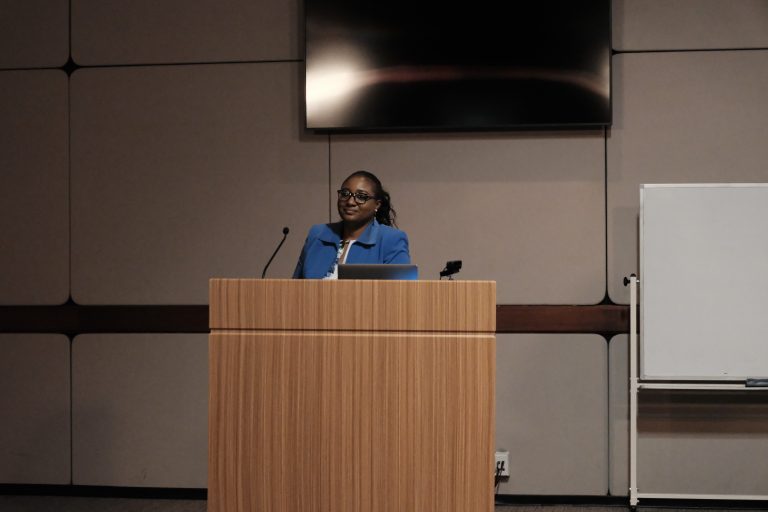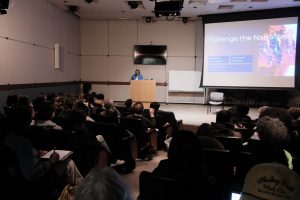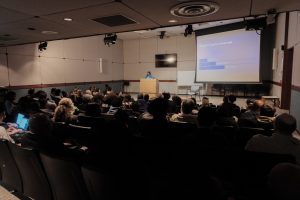
On the evening of Feb. 12, 2025, the Pulliam Center's Watson Forum at DePauw University welcomed acclaimed scholar, author and public intellectual Dr. Jennifer Mike for a thought-provoking lecture as part of the university's 2025 Black History Month events.
Dr. Jennifer Mike’s powerful lecture, titled "Deconstructing Accusation and Domination in the African World: Building a More Inclusive Future," presents the historical and current impacts of accusation within the African diaspora. As an attorney, academic and human rights advocate, Dr. Mike brings a compelling perspective that encourages her audience to critically examine social structures and cultural narratives where injustice remains.
Dr. Mike opened her lecture by emphasizing the importance of fostering dialogue in African and African American communities, especially during Black History Month. This annual observance honors the achievements and resilience of Black community, while also reminding us of the persistent struggle for justice. Central to Dr. Mike's address was the concept of accusation, a term she defined from her experience in criminal law. She illustrated how accusation, both legal and social, carries a stigma that often leads to marginalization, social stigmatization and psychological distress. More significantly, she highlighted how accusations have historically been weaponized for control, racial domination and cultural erasure, dating back to colonialism and the transatlantic slave trade.
Dr. Mike traced these accusations back to colonial narratives that dehumanized Africans, portraying them as "barbaric" and "savage" to justify enslavement and exploitation. She discussed how this historical framework has persisted today, with black individuals frequently facing accusations of criminality, moral ineptitude and social deviance. Such narratives, she argued, have contributed to systemic racism and economic exclusion that demand black people to work harder to prove their worth and humanity.
One of the most compelling aspects of the lecture was Dr. Mike's exploration of accusation as a cultural weapon. According to Dr. Mike, racialized groups have long been labeled as lazy, immoral and wasteful in literature, media and popular culture, with these stereotypes shaping discriminatory policies and reinforcing racial hierarchies. Therefore, it is necessary for audiences to recognize these accusations as social constructs for maintaining power imbalances and call for intentional resistance through education and cultural reclamation.


The lecture also delved into the modern impact of these historical accusations as black individuals often carry an invisible weight of proving themselves in every aspect of life. Dr. Mike poignantly described the constant internal questioning—“Am I doing well? Am I failing my community?”—that stems from these stereotypes. She emphasized that this burden is not self-imposed but rather a result of societal assumptions about blackness and worth.
To counter these destructive narratives, Dr. Mike introduced the Ubuntu framework, an African philosophy centered on community, compassion and shared humanity. She argued that inclusivity built on collective action, cultural exchange and mutual support can overcome these persistent accusations. By fostering solidarity and resilience, communities can challenge historical narratives of inferiority and work towards a more just and inclusive future.
As the lecture concluded, Dr. Mike left the audience with a challenge: to actively resist the cycle of accusation and stigmatization by embracing empathy, education and cultural pride. She reminded everyone that accusations are not truths, but they are constructs that can be dismantled through intentional action and a commitment to justice.
The event closed with an invitation to continue the conversation over light refreshments, creating space for reflection and connection. Dr. Mike's powerful insights and compassionate call to action left a lasting impression, inspiring attendees to become fierce advocates for equity, understanding and positive change.